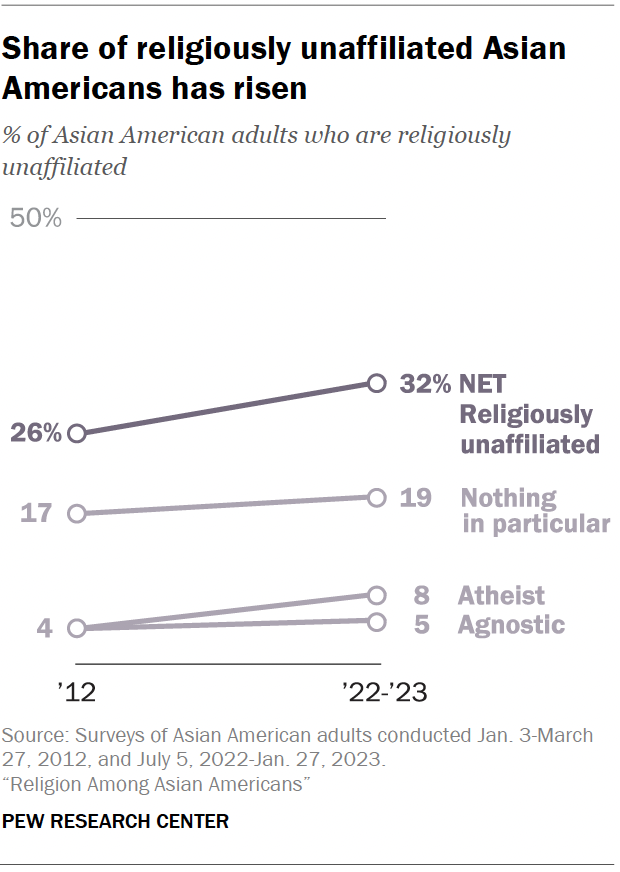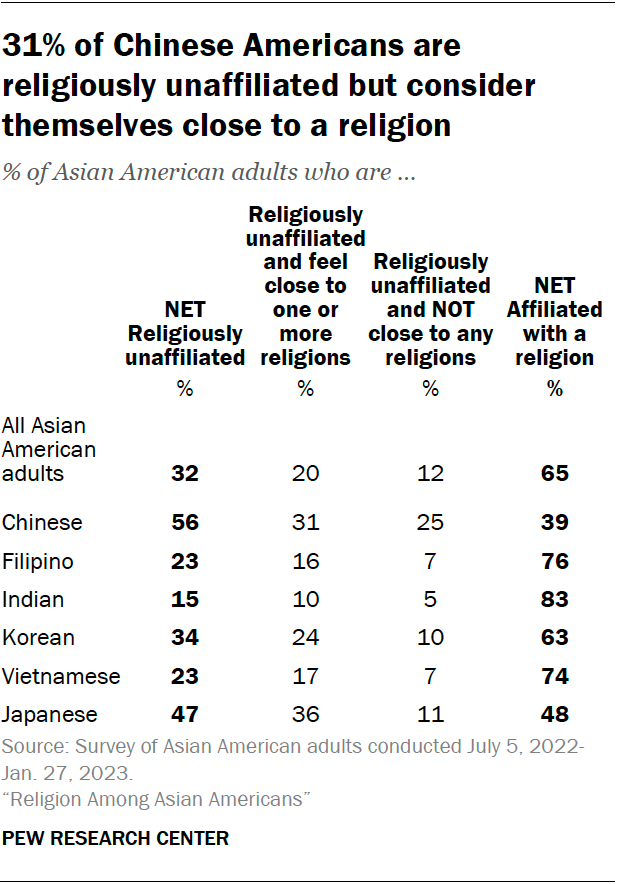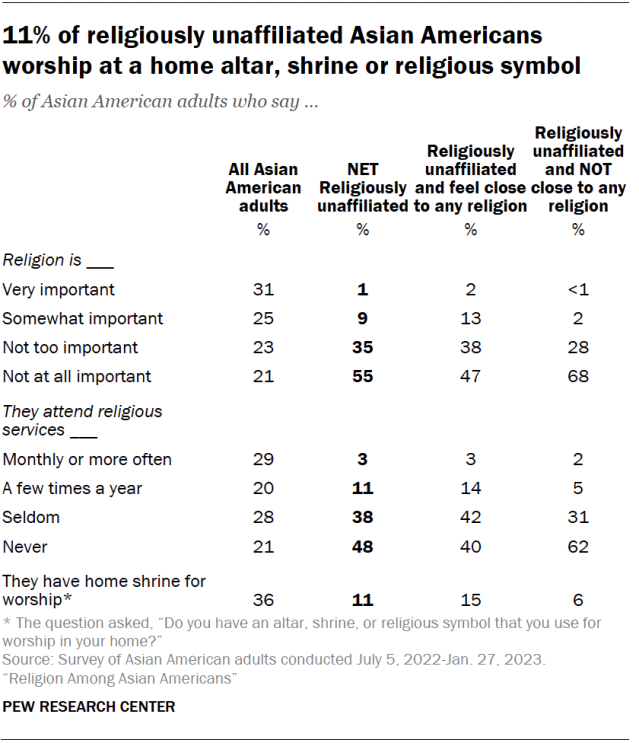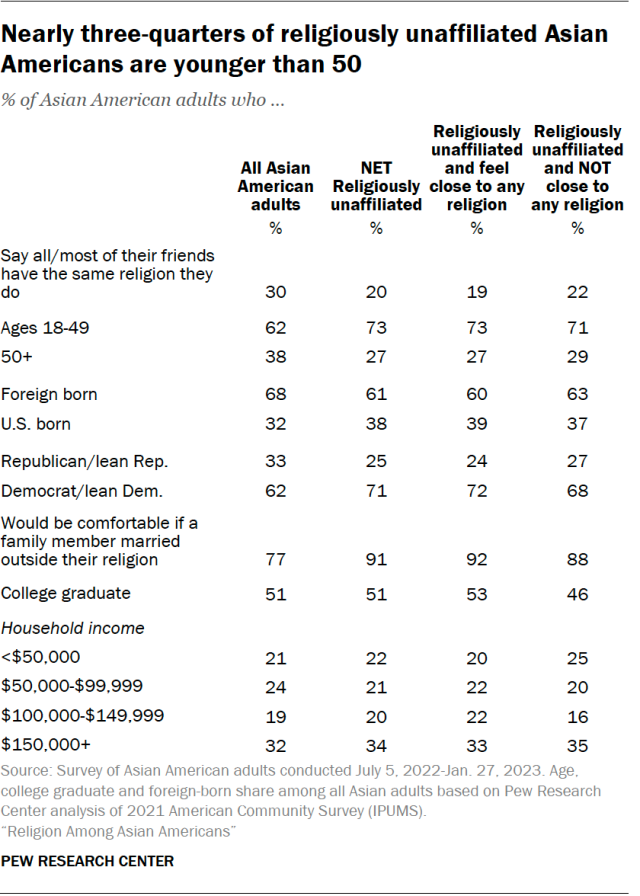About one-third (32%) of Asian Americans have no religious affiliation, meaning that they answer a survey question about their present religion by saying they are atheist, agnostic or “nothing in particular.” As with Americans overall, this share has been growing; it was 26% in the Center’s last major survey of Asian Americans, in 2012.

As in 2012, more religiously unaffiliated Asian Americans describe their religion as “nothing in particular” than identify as atheist or agnostic.
In addition, most religiously unaffiliated Asian Americans say they feel close to one or more traditions for reasons other than religion, such as ancestry or culture. Overall, just 12% of Asian Americans say they have no connection to any of the religions or philosophical traditions measured in the survey.
Chinese and Japanese Americans are more likely than other Asian Americans to be religiously unaffiliated. About half of all Japanese American adults (47%) describe themselves as atheist, agnostic, or having no particular religion, as do 56% of Chinese American adults.
Chinese (47%) and Japanese Americans (58%) are also more likely than other Asian Americans to feel close to a faith tradition for reasons aside from religion (regardless of whether they identify with a religion or are unaffiliated).

A quarter of Chinese Americans say they have neither a religious affiliation nor feel close to any religious or philosophical tradition for other reasons, such as ancestry or culture. This is the highest share among the large Asian origin groups to reject any kind of connection to religion, and about twice the share of the overall Asian American population that does so (12%).
A recent Pew Research Center report on religion in China showed that formal identification with religion is also low there: Chinese surveys indicate that only about one-in-ten Chinese adults say they have a religion, though much larger shares say they engage in spiritual practices such as lighting incense or making offerings to Buddha.
On the other hand, Indian (5%), Filipino (7%) and Vietnamese (7%) Americans are significantly less likely than the overall Asian American population to say both that they are religiously unaffiliated and that they have no feeling of closeness to any of the religious or philosophical traditions measured in the survey. Put another way, upward of 90% of adults in those three origin groups express some connection to a religious tradition.
Importance of religion among the unaffiliated

Perhaps not surprisingly, most religiously unaffiliated Asian Americans attribute little importance to religion in their lives. However, there are notable differences between those who express some closeness to a religious or philosophical tradition and those who do not.
Religiously unaffiliated Asian Americans who are close to at least one religious tradition are more likely than those who are not to say that religion has at least some importance in their lives (15% vs. 3%).
Similarly, while religiously unaffiliated Asian Americans are less likely than Asian American adults as a whole to say they never attend religious services, there are differences between unaffiliated people who say they feel close to a religion or philosophical tradition and those who express no such closeness. About six-in-ten (62%) of those with no affiliation and no affinity to a religion say they never attend religious services, compared with four-in-ten of those who are religiously unaffiliated but say they are close to at least one tradition.
Religiously unaffiliated Asian Americans who feel close to at least one tradition (aside from religion) are also more likely than those who are not close to any religion to say they have an altar, shrine or religious symbol for worship in their home (15% vs. 6%).
Social and demographic profile of the unaffiliated

Religiously unaffiliated Asian American adults are more likely than the overall Asian American population to be younger than age 50 (73% vs. 62%), born in the United States (38% vs. 32%), and Democrats or Democratic leaners (71% vs. 62%). There are no major differences in education or income levels between Asian Americans who are religiously unaffiliated and those who identify with a religion.



